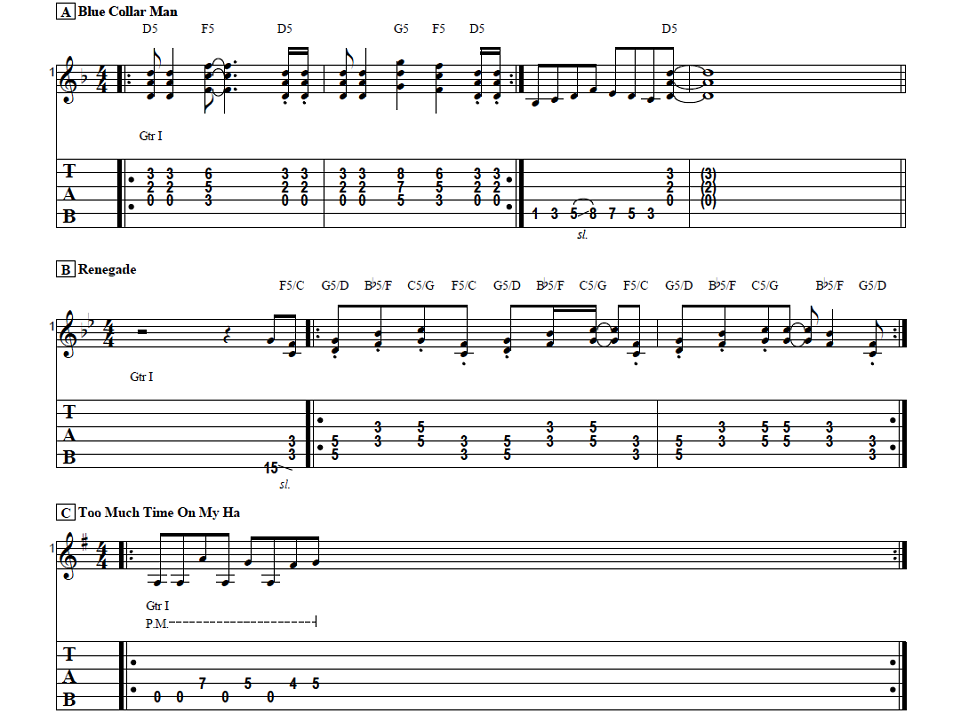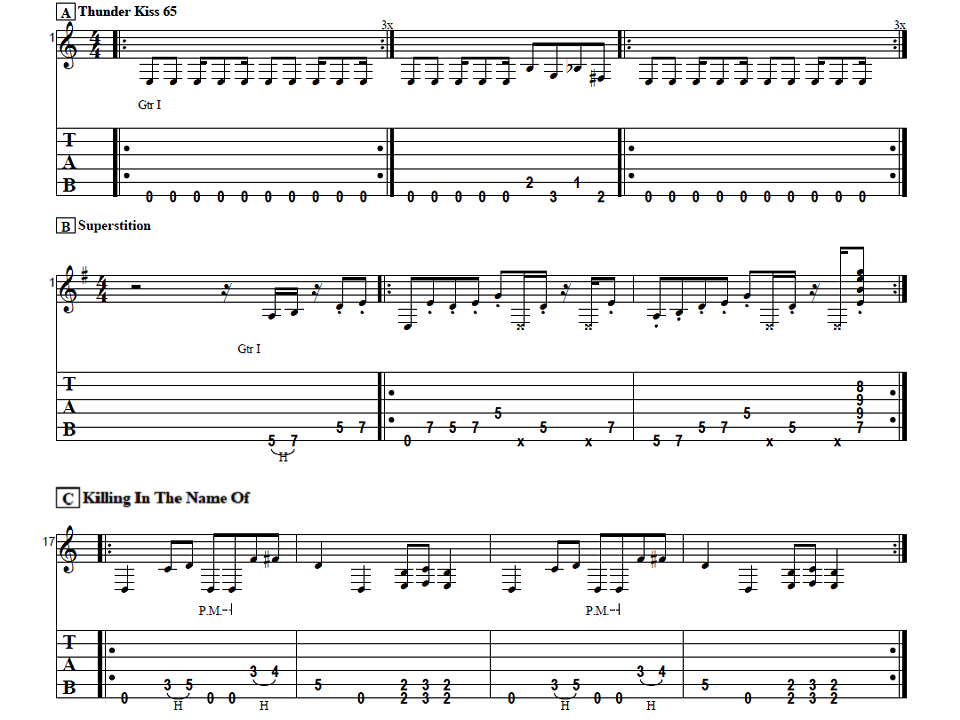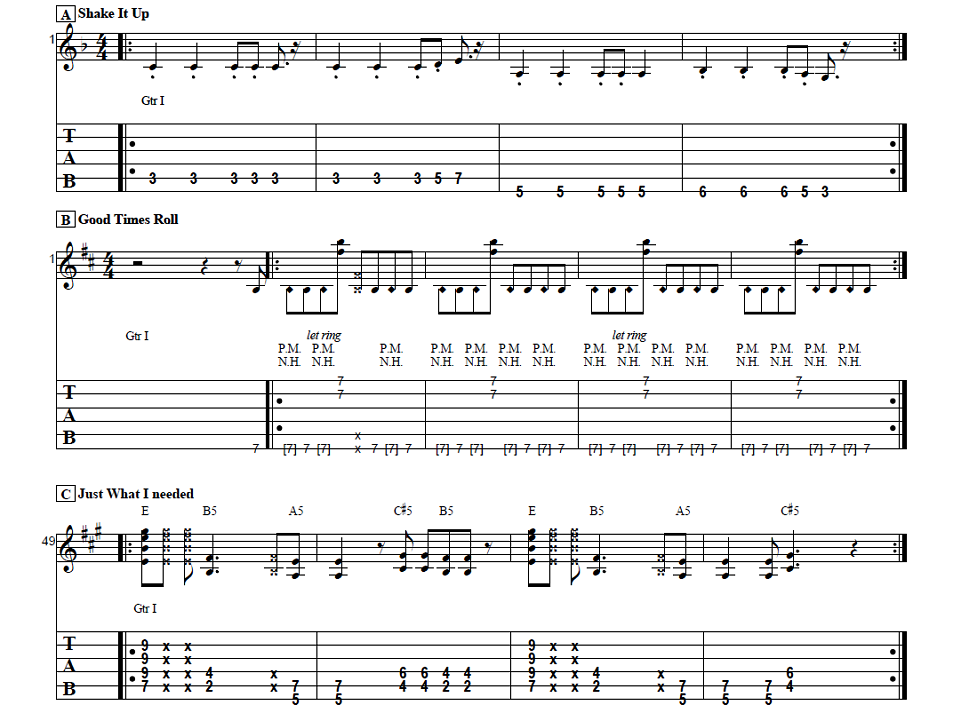How To Play Crosstown Traffic
In this Guitar Control video lesson we are going to go over a few parts from Hendrix popular song, “Crosstown Traffic”. We’re going to go over the main lead melody part and also go over the rhythm. Also, if you listen to the actual recording Hendrix is tuned down a half step.


This lesson is in standard tuning, so I’m playing the riff in the same spot he is when he’s tuned down, but my guitar sounds higher than his. In Eb tuning which is what he’s playing, also called a half step down, the 6th string low E note becomes an Eb, The 5th string becomes Ab, the 4th string becomes Db, the 3rd string becomes Gb, the 2nd string becomes Bb, and the 1st string, the high E, also becomes Eb. If you’re using a tuner you might see that it says D# instead of Eb, that’s an en harmonic equivalent, which means two notes with different names, but they are the same pitch, the same exact sound, the same exact note. D# and Eb are the same, how you can figure it out is it’s the note before a sharp and after a flat. The sign for a sharp looks like a number sign or a hashtag, #, and for a flat it looks like a lowercase letter “B” So Eb is the same as D#, Ab is the same as G#, Db is the same as C#, Gb is the same as F#, Bb is the same as A#, and of course Eb is again, D#.
Step 1: The Rhythm
The first time through our riff is slightly different than every other time. In this Jimi Hendrix guitar lesson we will go into detail and explain all the variations. So first we start on the 5th string 4th fret with our third finger, we go 4, 4, so we pick the 4th fret twice. Then we hammer-on on the 6th string 2nd fret to the 4th fret. Real quick, a hammer-on if you don’t know what it is is when you pick the string once and then slap your finger down to get the next note. So one pick, but two sounds, and we do that by holding one finger down, while we slap down a different finger to the next note we want to hear. It creates a smooth legato sound.
So after that hammer-on we drop to the 5th string and we go chromatically 2nd fret, 4th, 5th, then back to the 2nd fret, same string. And all of those are hammer- on’s except we pick the last 2. Then we move our ring finger up one string to the 6th string 4th fret then to the 6th string 2nd fret and pick twice. Then we drop down to the 5th string and hammer-on the 2nd fret to the 4th frets with our first to third fingers. Then we do the same chromatic lick on the 4th string, so frets, 2, 3, 4 all hammer-on and then back to the 2nd fret same string and pick it once and end on the 4th fret 5th string. So all of this is the same every time. If you are enjoying learning this Hendrix classic be sure to also check out our lesson on how to play Purple Haze on the guitar by Jimi Hendrix.
Now the only different in this riff is that after the very first hits on the 4th fret 6th string, we are going to play we’re going to strum down only picking the 2nd and 3rd strings holding them down with our third finger on the 4th fret 3rd string and our pinky on the 5th fret 2nd string. This is called a double stop. When you play two notes together on the guitar. This can be a little tricky so practicing going back and forth between those two spots is really smart. So isolating that change and slowing it down, moving between the two picks on the 4th fret 6th string to our double stop on the 2nd and 3rd strings.
Practicing moving back and forth between these two parts until it becomes second nature. Guitar is muscle memory so training yourself to practice slow and play the right stuff is key, when you try to play something before you’re ready, often times we will find ourselves playing the part wrong. And unfortunately if you do this too many times it becomes a habit and it can be really hard to break it. So practicing slow and playing the riff correctly in the first place will save you lots of time in the long run. So playing this riff, the very first time through we leave out the double stop, but every time after it’s included.
Step 2: A Closer Look At The Lead Melody
We start with our third finger and we’re going to slide it from the 11th fret to the 13th fret 3rd string. Then we’re going to drop our middle finger to the 2nd string 12th fret, back to the 13th fret on the 3rd string and then slide it back to the 11th fret and then pull the 11th fret off to 9. So all in one movement and all on that 3rd string. Then we pick the 11th fret 4th string and end on the 9th fret 3rd string with lots of vibrato. Vibrato is when we wiggle the pitch back and forth around the pitch we want to hear, not bending it to a new one. It’s all about control and shaking it evenly.
Recap: How To Play Crosstown Traffic
I hope you enjoyed this Jimi Hendrix Guitar lesson! What better guitarist to learn from than Jimi Hendrix! And This song is super fun and upbeat. Remember to isolate the change in the main riff when we add in our double stop and make sure to get your slides down for the main melody.



